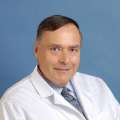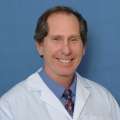When , strode out to the field at Dodger Stadium to throw out the first pitch at the Dodgers’ game against the Miami Marlins on Aug. 20, he wasn’t just thinking about the baseball in his hand or his five grandkids looking on.
He was thinking about the nearly five decades he’s spent at UCLA — first as a medical student, resident and fellow; and then as a clinician, researcher and professor who colleagues say has transformed cancer care at UCLA Health and beyond.
“When people say, ‘Why don’t you retire? You like fly-fishing. You could just jump in your car and go,’ one of the reasons not to do that is I still love what I’m doing,” Dr. Glaspy says. “But another reason not to do it is I’m able-bodied right now, and I’m still paying back …
“UCLA made me. And I owe them for that and I owe the people of California for that.”
Healthcare All-Star
A professor of medicine at the , Dr. Glaspy was recognized by the Los Angeles Dodgers as a Healthcare All-Star for his many achievements at UCLA Health. (UCLA Health has been the since 2019).
With his long and fruitful career, Dr. Glaspy rarely spends time tossing a baseball around, he says, but he was able to warm up in the bullpen before taking the field with his eldest grandson.

“I think he was kind of proud,” says Dr. Glaspy, who is on the Founders Board of the . “The relationship between UCLA and the Dodgers is obviously one of mutual respect. I could feel it in the air with the Dodger people.”
As far as Dr. Glaspy’s colleagues are concerned, the team couldn’t have chosen a more deserving honoree.
“Dr. Glaspy exemplifies all things that we want in our UCLA faculty in terms of contributions to research, education and excellent clinical care,” says , a professor of medicine in hematology-oncology at the and a former trainee under Dr. Glaspy. “I can think of many times, however many years after my fellowship, I still use skills I learned from John in how to speak with patients and conduct research. … And in terms of his direct patient care, there are millions of patients that John has touched and whose families he’s affected.”
A career well spent
For Dr. Glaspy, it’s all part of a rewarding career at a dynamic academic institution.
“When you’re younger, you want to make some personal contributions, and as you get older, you want to build something that’s going to be there after you’re gone and you want to raise up some young people who are better than you were,” he says. “The best thing I can point to is the people who worked with me when they were young and coming up and are out there doing wonderful things.”
Reflecting on his career, Dr. Glaspy is grateful for the growth of the faculty, research and translational science for cancer treatment at UCLA Health. The oncology faculty, for example, had six members when he started and has grown to hundreds, he says.
“We’ve changed the way that cancer medicine is practiced. As a group, we’ve changed it dramatically,” Dr. Glaspy says.
“Once you are committed to something like this and have a critical mass, and have the values that the university inculcates in you, you end up with a very explosive — in a good way — mixture that can make everybody’s feeling of participation and authorship greater than it would have been if they were doing things by themselves. So it’s a good place to be.”






